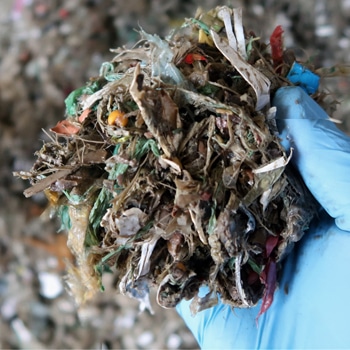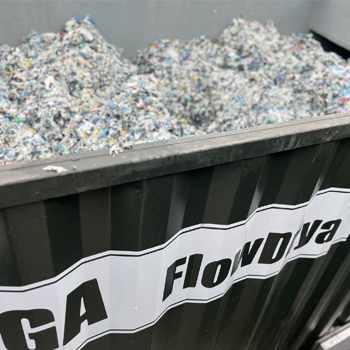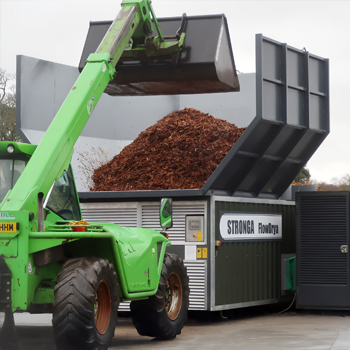Mr. P. Stott and Mrs. J. Stott, the owners of ‘Larch Cottage Nurseries’ in Cumbria, England, have been seeking ways to make their operation peat-free while maintaining the use of high-quality growing substrates for the nursery’s extensive range of grown plants which are sold to a sophisticated, discerning clientele.
Stronga’s collaborative journey with Larch Cottage is leading them towards a more sustainable solution using alternative growing substrate blends. Our steam heat-treatment solution has enabled Mr. and Mrs. Stott and their propagation team to create their own blends which are customised based on the plant’s needs – using materials from combined on-site material including pasteurised soil, steamed bark mulch and heat-treated spent materials accumulated over 40 years. Their new, circular, resource-efficient process is visualised in the process graphic below.

Re-Thinking the Uses of Peat
Peat is the organic surface layer of partially-decomposed plant material. It’s weed-free benefits, ability to retain moisture and aerate soil make it extremely popular among gardeners, especially those with unique species of plant. For many years, it has been the fundamental base material for nearly all growing media blends, however; peatland extraction has caused habitat degradation which continues to have a significant implication on ecosystems, climate change and global warming. In the UK alone, peat ecosystems store up to 3.2 billion tonnes of carbon and this is at risk of being released back to the atmosphere as CO₂ during extraction. Increasing peatland restoration projects and restriction implementation has been put into place recently with suggestions this will be enforced by 2030.
This will reduce peat usage dramatically, so the time to act is now.

Peat’s wonderful qualities make it challenging for growers to replace. Many alternative materials do not harbour the intrinsic qualities of peat substrates and lack key characteristics such as moisture retention, which is required for high value plant growing in commercial nurseries like Larch Cottage. Stronga’s FlowSteama offers an effective solution to allow the valuable qualities of spent peat to be recycled and reused, using clean steam, allowing growers to meet the challenge in an economic and environmentally-friendly way.

A Carbon-Conscious, Family-Run Nursery
‘Larch Cottage Nurseries’ is a utopia for leading technical, horticulturists and enthusiasts alike. Its rich display of sculptures, art and variety of unusual plants, create an immersive and intriguing outdoor space, full of various ‘rooms’ that leave visitors wanting more. During Stronga’s initial visit to the nursery, our team were struck by the scale, beauty and care that had gone into development and maintenance, a lifetime’s commitment. It is clear that Mr. and Mrs. Stott and their team’s hard work, energy and passion for horticulture and aesthetic structures is central to the nursery’s considerable success.

At Larch Cottage, quality matters.
With more than 15,000 lines of rare home-grown available for purchasing, a constant stream of enthusiasts from far and wide regularly visit the flourishing gardens. The nursery also boasts a popular Mediterranean-style restaurant which sources fresh, home-grown ingredients from the on-site kitchen garden. In order to uphold these high standards, the plants and ingredients need to be grown from a rich, nutritious soil and growing substrate to allow them to prosper.
Mr. and Mrs. Stott have continued their fantastic work in both the nursery and local community. In 2021, Larch Cottage was recognised for their positive contribution to health charities when they won the ‘RHS Partner Gardens Award’. Despite their pioneering attitude, like many, Larch Cottage are facing a struggle in the transition to go ‘peat-free’, one of the nurseries’ carbon-conscious commitments. Through the Stott’s research into a practical solution, they concluded that steam pasteurisation was a central pillar to taking control of this essential, but highly challenging, process.

Transition to Peat-Free with “Green”-Steam
Steam pasteurisation brings a new lease of life to spent, weed-infested growing materials, soils, bark mulches and more, allowing professional horticulturists to create their own high-quality growing blends. In-house steam sterilisation is the best available solution to avoid purchasing one-time-use blends from often unknown, uncertified sources.
Through a combination of extensive research into the history of early ‘steam pioneers’ and poor experiences with bought-in peat-free blends, the Stott’s decided to take matters into their own hands by creating their own plant-specific growing substrate blends. Mixing the individual components of residual on-site materials, in-house and at low cost, means they could create a suitable quality media for plants to thrive in.
By steaming each blend component separately, to remove weeds seeds and pathogens harmful to delicate propagated plants, the Stott’s are able to create a ‘clean’, rich, base component for blending, regenerating their huge supply of spent material built up in the propagation area, which includes peat residues and spent potted materials.

Steam pasteurisation is one of the only economic and environmentally-conscious ways spent material can be revitalised. As a method of pasteurisation, steam has been proven for well over a century and represents one of the most ‘green’ and ‘clean’ alternatives to one-time substrate purchasing and chemical sterilisation. Through steam pasteurisation, the Stott’s, who are strong advocates for chemical-free growing, can continue using ‘irreplaceable’ peat in the nursery, derived from a considerable mound of spent material.
Stronga value working with those actively pioneering genuine, cleaner growing solutions. Larch Cottage Nurseries hold the same values as Stronga, so we were delighted to enable them to meet their goal of creating a sustainable, closed loop, circular system.

Steam Pasteurisation vs. Chemicals
The information below has been adapted from the highly regarded guide - ‘The U.C. System for Producing Healthy Container- Grown Plants’. This guide contains a mixture of sterilisation methods but principally aims to argue the importance of steaming over chemical sterilisation methods. The guide compares two (now banned) chemical pesticides with steam pasteurisation; and the benefits of steaming are abundantly clear.
1. While steaming can take as little as 30 minutes to treat growing materials, chemical spraying methods can take significantly longer, in some cases up to 3 days. This delay carries significant labour and financial burdens for nurseries like Larch Cottage, who have an abundance of plant varieties to propagate, grow and sell.
2. Steaming requires a shorter cooling period after completion when compared to the much longer required aeration after chemical treatment.
3. Steam pasteurisation effectiveness can be measured immediately through temperature measurements of soil (growing materials). Many chemical sterilisation methods indicate their effectiveness after crop growth, normally when it is too late.
4. There are no toxicity residues associated with in-vessel steam sterilisation; many chemical alternatives are toxic to plants and even humans, especially in un-ventilated situations. Steaming is far safer and leaves behind no harmful residues which is especially important to the people onsite.

5. Steaming is machine-operated and can be monitored remotely; FlowSteama has minimal labour requirements and doesn’t require the accuracy demanded during chemical spraying.
6. Steaming provides a natural alternative to chemicals which penetrates the full growing media mass, preventing and reducing diseases, promoting a better growing base for healthy plants to flourish.
7. Reusing spent on-site materials allows growers to take control of their propagation and growing mediums, whilst creating a closed loop circular process.
8. Steaming encourages plant growth and increases crop yields thorough revitalising spent materials, reducing weed seeds and pests and improving soil/substrate quality, providing optimal seed germination conditions. This increases the quality and quantity of healthier, flourishing and hardy plant growth.
Steam remains the best overall method of phytosanitation across all media, destroying harmful fungi, bacteria, nematodes and weeds, with full, immediate assurance of effectiveness.

Waste Resource Residue to Revenue
With peat resources now under strict regulations and increasing in cost; reusing and recycling mounds of spent materials allows the team at Larch Cottage to create their own nutrient-rich growing blend which can be recycled over and over as part of an on-site circular economy. Reusing the waste mound allows for increased profit where transport and carbon emissions from single-use substrate shipments and substrate purchasing costs are reduced.
Improved Economy through Pasteurisation
At Stronga, we believe it is far more economic to be preventative and pasteurise substrates before planting than to attempt to salvage infected crop after the damage has been done. Using 200’C superheated, low-pressure steam from the Stronga SteamBoila, FlowSteama ensures all disease-producing organisms are eradicated and the growing material is fully disinfected without damaging vital nutrients. It is, however, worth noting that, in certain instances, soil and microbial revitalisation may be beneficial after steaming.
The ‘container growers guide’ below shows the temperatures required to kill specific pathogens and other organisms harmful to plants. Most of the temperatures indicated are for 30-minute exposure under moist conditions.

Invest in Iconic Steam Equipment
Stronga have been designing FlowSteama steam pasteurisation vessels for many years now and have extensive experience commissioning the equipment for a variety of different materials, including bark mulch, soil, and coir. Stronga’s engineers design FlowSteama vessels based on customer requirements on a project-by-project basis. For Larch Cottage, the requirement was for an output of circa 3m₃/hr in a compact, mobile FlowSteama Rova which had a SteamBoila scaled to match requirements.
The delivered steam vessel looked like the product in the 3D visualisation below.

Unlock Years of Built-Up Potential with FlowSteama
- FlowSteama is semi-automated and modular, meaning the equipment can be moved with ease, as and when required.
- FlowSteama accepts low pressure, superheated steam which only requires 11% more energy to increase the temperature from 100’C to 200’C but offers vastly improved heat transfer and uniform heat treatment quality.
- FlowSteama is a fully insulated, containerised in-vessel system which has minimal energy loss during the heat-treatment process.
- The unique PulseWave™ agitation system ensures material is continuously mixed so steam can fully penetrate the load and pasteurise it, efficiently and uniformly.
- The SteamStation™ HMI (photo below) enables operators to maintain full control over the sterilisation period and the material’s ‘time at temperature’. Data logs can be kept for a year to evidence pasteurisation completion.
- SteamBoila equipment automatically modulates down when no more steam can be absorbed into the material and accepted into the FlowSteama’s steam chamber.
- Stronga’s heat recuperation system option allows for energy recovery and thus improves energy efficiency by 25%*, aligning with Larch Cottage’s values. *This is dependent on certain factors; please ask Stronga for more information.

Architects of Renewal
Despite the many wonderful qualities of peat, Larch Cottage are all too aware of the negative effects of peat extraction. Realising many peat-free alternatives were not suitable for their operation, they took the leap into the world of steam pasteurisation, together with Stronga. Using steam pasteurisation to treat their large stockpile of spent soil, peat and bark mulch, the Stott’s and the team are now able to produce a suitable nutrient-rich alternative which combats waste and any additional purchasing costs of virgin substrate.
Collaborate with Stronga today and begin your journey towards resource renewal – info@stronga.co.uk
Bibliography
Baker, Kenneth F., Philip A. Chandler, Richard D, Durbin, John Ferguson, J. W. Huffman, O. A. Matkin, Donald E. Munnecke, Chester N. Roistacher, Warren R. Schoonover, And R. H. Sciaroni, ‘The U.C. System for Producing Healthy Container-Grown Plants, through the Use of Clean Soil, Clean Stock, and Sanitation’, University of California Division of Agricultural Sciences Agricultural Experiment Station – Extension Service, 1957.
https://archive.org/details/ucsystemforprodu23bake/page/n3/mode/2up



Share this post